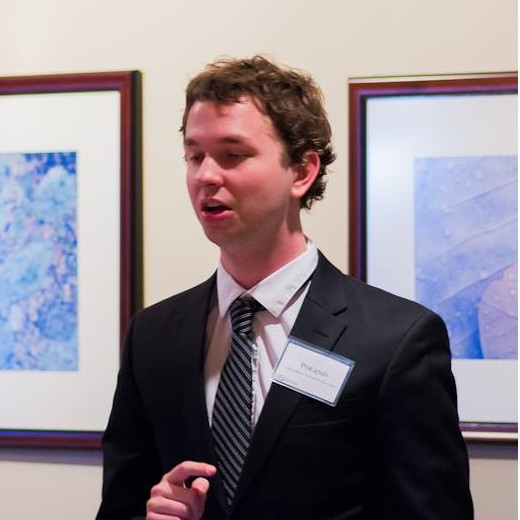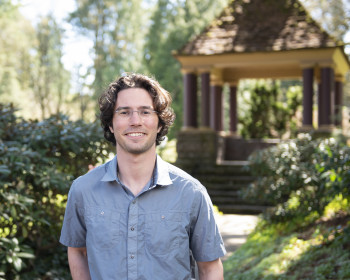Students earn grant to promote global peace
Open gallery

For the eighth year in a row, Lewis & Clark students have earned a competitive grant from philanthropist Kathryn W. Davis’s 100 Projects for Peace Initiative. Over the summer, project leaders Nway Khine ’15 and Sam Shugart ’15, along with Katie Schirmer ’17 and Ira Yeap ’14, will teach English to orphans in Taunggyi, Myanmar.
The grant program encourages undergraduate students to design grassroots projects to be undertaken around the world. Each year since the program’s inception, Lewis & Clark students have earned the coveted $10,000 grants to pursue projects addressing diverse challenges, including providing clean water in Ethiopia, educating residents about human rights in Morocco, and teaching self-defense to women in India.
Nway Khine ’15
Majors: Biochemistry, Molecular Biology
Hometown: Taunggyi, Myanmar
Sam Shugart ’15
Major: International Affairs
Hometown: Vashon Island, Washington
How did your group decide to focus on teaching English to orphans, and how did you select Myanmar for the site of your project?
Nway: I am from Taunggyi, Myanmar, and I have always wanted to do something for my own country. After I came to Lewis & Clark, I met so many people who wanted to give back to society, so my desire to do something for my country grew even more. In light of the ethnic and religious violence in Myanmar, I thought I could do something to promote peace and improve the situation. When Sam told me about the $10,000 grant from 100 Projects for Peace, we began to actively find ways that could potentially target the violence.
Though Myanmar is moving toward democracy, past decades of military regime make our group very skeptical of doing any peace promotion project directly related to the different religious and ethnic groups. We do not want to get into trouble and risk our lives. We thought teaching English to orphans would allow us to bring the different religious groups together while remaining politically and religiously neutral. This would make our working conditions more favorable and would not threaten us and everyone involved. We also think that doing this project abroad, especially since it is self-initiated, is a rare learning experience and we embrace this opportunity.
Sam: Our project came out of shared desire to spend our time at Lewis & Clark doing the most could. Both Nway and I had heard about the 100 Projects for Peace program and decided that we would try to create a project worthy of funding. I had done research into Myanmar for another project, and Nway, having grown up in Myanmar, was already aware of some of the societal divisions. Once we had decided on our goal, we chose teaching English because it provides students of future generations with greater economic opportunities, and creating a shared classroom environment has been shown to help foster reconciliation and friendship across different cultural backgrounds.
How do you think your Lewis & Clark education has influenced your project?
Nway: I realized that Lewis & Clark does not train me for a specific sector of work—it instead allows me to use skills that I learn from my biochemistry class—such as problem solving and critical thinking—to assist me in overcoming every barrier that I face, especially in this project.
The interesting thing is that sometimes I did not even recognize that I accumulated those skills from the experiences here until I was working on our project. The experiences at Lewis & Clark slowly made me understand that problem solving means when you have a problem and you are stuck, you reach out to different bodies to find solutions. Throughout this project, we ran into so many obstacles, and each time the obstacles were overcome by the collaboration between our group and the various resources on campus. We reached out to Lewis & Clark ombudsperson and conflict resolution specialist Valerie White, Assistant Professor of International Affairs and southeast Asia expert Cari Coe, the Academic English Studies department, former Director of International Students and Scholars Greg Caldwell, and many more. Our project would not have even come close to the results that we’ve achieved today if we did not have their support and insight. They took time out of their busy schedules to help us and make our summer dream come true. Lewis & Clark not only teaches skills that are useful, but also provides the environment where our group can learn, explore, and work together to turn our ideas into actions.
Sam: Without Lewis & Clark, this project would have never been possible. Many classes place an emphasis on creative problem solving and encourage students to seek positive change throughout the world. Yet even more important than classes are resources and the attitude of faculty toward student-led projects.
I cannot emphasize enough how the support of various faculty—from international affairs to Academic English Studies to members of the 100 Projects for Peace committee—was instrumental in turning our ideas into a working project. In our experience, those at Lewis & Clark were willing to take time out of their schedules to sit down and help us work out the many problems with this project, even if we had never taken a class with them or were not in their department. I am hard pressed to think of another place that offers this type of resource to undergraduates undertaking similar projects.
More Newsroom Stories
Public Relations is located in McAfee on the Undergraduate Campus.
MSC: 19
email public@lclark.edu
voice 503-768-7970
Public Relations
Lewis & Clark
615 S. Palatine Hill Road MSC 19
Portland OR 97219

